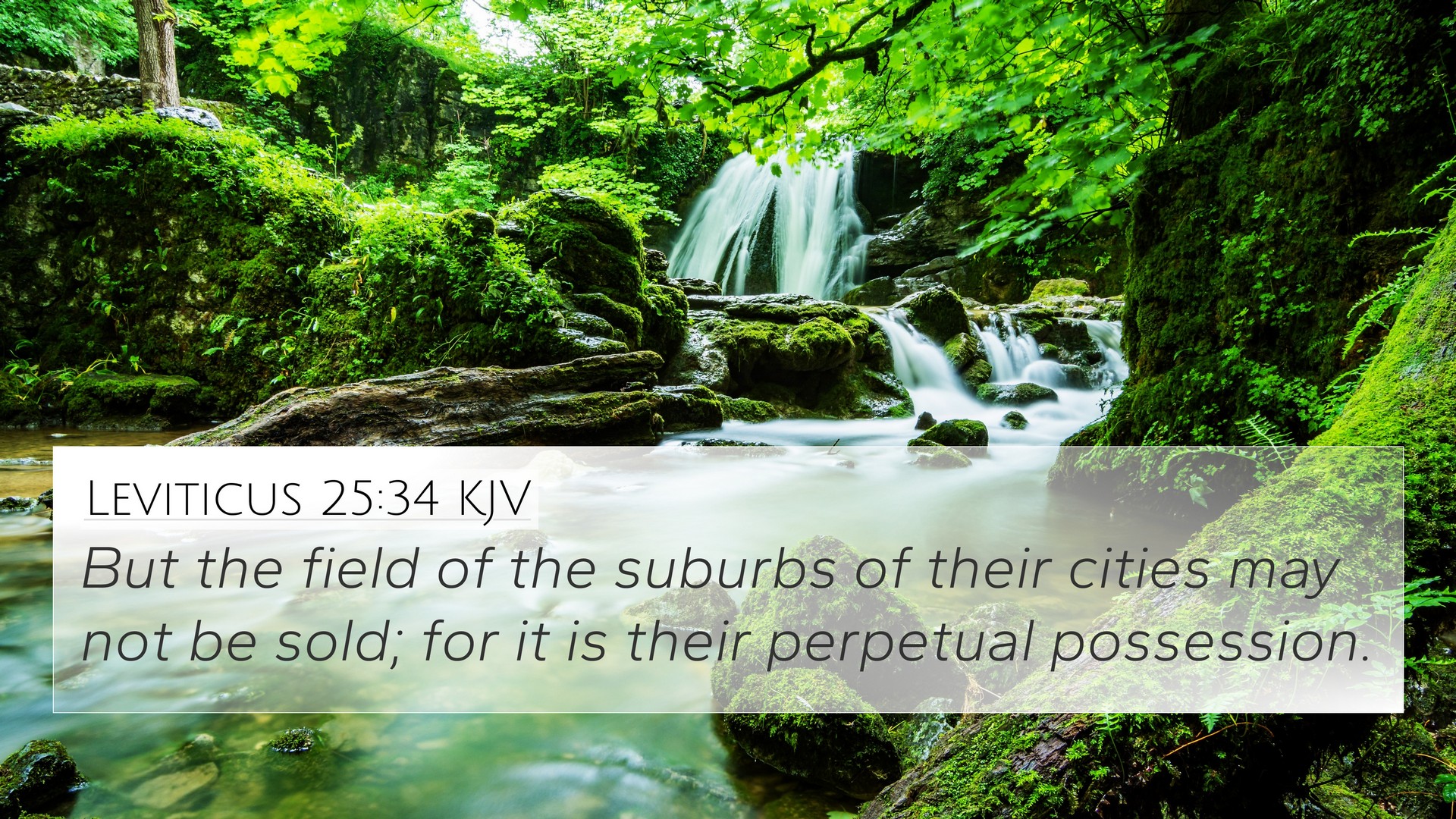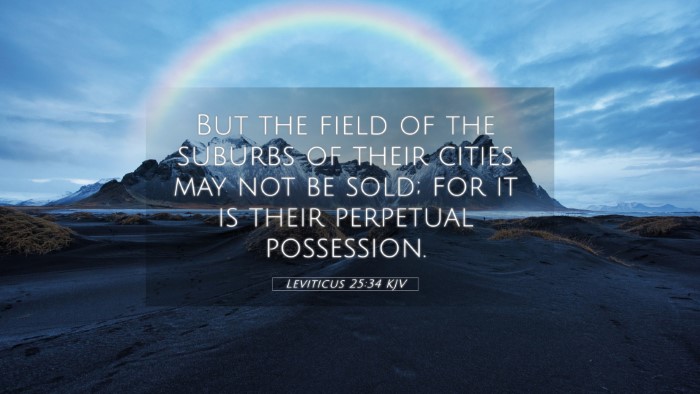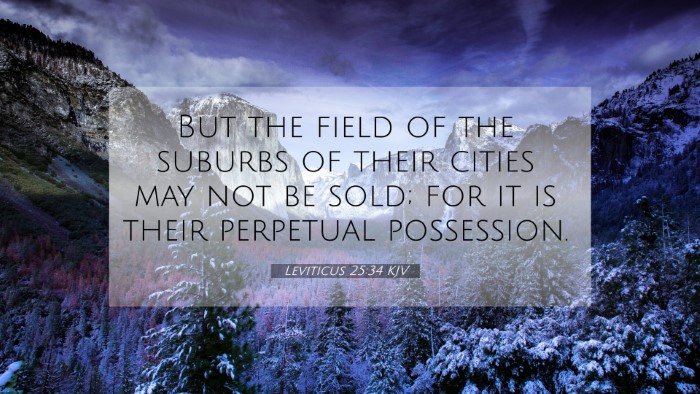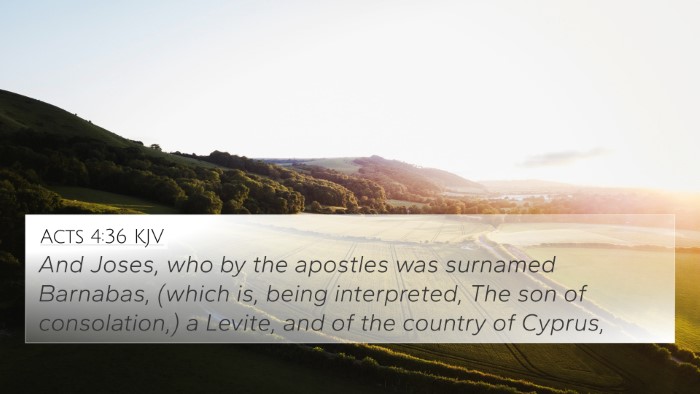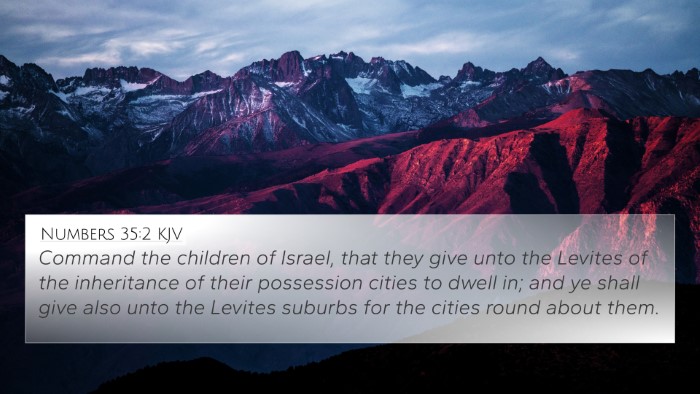Understanding Leviticus 25:34
Leviticus 25:34 states: "But the field of the suburbs of their cities may not be sold; for it is their perpetual possession." This verse emphasizes the importance of land ownership and divine provisions for the Israelites.
This commentary provides insights into the verse by combining interpretations from public domain commentaries, enhancing our understanding of this crucial biblical text.
Meaning and Interpretation
The key theme of Leviticus 25:34 revolves around the permanence of inheritance in Israelite society. The fields that are designated for the Levites symbolize their distinct role in the community, committed to the service of God, and the emphasis on their perpetual possession aligns with the holistic theological narrative within the Pentateuch.
Insights from Prominent Commentators
- Matthew Henry: Henry elaborates on the significance of the Levites' inheritance. He notes that the fields in the suburbs were set apart to ensure their needs were met, emphasizing God's provision and the idea of spiritual sustenance linked to physical resources.
- Albert Barnes: Barnes highlights the connection between this prohibition against selling land and the preservation of the sanctity of God’s laws. He explains that the Levites were to maintain their designated areas not merely for physical support, but as a symbol of their alignment with God's covenant.
- Adam Clarke: Clarke emphasizes the cultural context surrounding land ownership and usage, pointing out how this divine ordinance was crucial for maintaining stability and order within the Israelite community.
Bible Cross References
Leviticus 25:34 connects with several other biblical passages that reinforce the themes of land ownership, divine provision, and the role of the Levites:
- Numbers 18:24: "For the tithe of the children of Israel, which they offer as a heave offering unto the Lord, I have given to the Levites to inherit." This verse highlights the inheritance given to Levites, supporting the idea of their perpetual possession.
- Deuteronomy 10:9: "Therefore Levi has no portion nor inheritance with his brethren; the Lord is his inheritance, just as the Lord your God promised him." This reinforces the unique position of the Levites and their dependence on God as their provider.
- Joshua 14:4: "For the children of Joseph were two tribes, Manasseh and Ephraim; therefore they gave no part unto the Levites in the land, save cities to dwell in, with their suburbs for their cattle and for their substance." This establishes a foundation for the Levites' land rights.
- Jeremiah 32:15: "For thus saith the Lord of hosts, the God of Israel; Houses and fields and vineyards shall be possessed again in this land." This reflects the enduring nature of land promises in Israel.
- Ezekiel 48:22: "And the suburbs of the city shall be to the priests, the Levites, and the city shall be in the midst of them." This affirms the ongoing role of Levites in relation to land and cities.
- 1 Chronicles 6:48: "And their brethren the Levites were appointed unto all manner of service of the tabernacle of the house of God." This reinforces their service in relation to the cities where they were granted inheritance.
- Hebrews 7:14: "For it is evident that our Lord sprang out of Judah; of which tribe Moses spake nothing concerning priesthood." This emphasizes the significance of priesthood, contrasting the role of Jesus with that of the Levites.
Thematic Connections
The themes presented in Leviticus 25:34 and its cross-references create a tapestry of God's covenant with Israel, highlighting how spiritual leadership requires material sustenance, and how land itself serves as a divine inheritance.
Understanding these connections invites us to consider how biblical themes interweave across both the Old and New Testaments. The Levites' perpetual inheritance foreshadows the eternal inheritance available to believers in Christ, linking the two Testaments into a cohesive narrative of redemption and provision.
Tools for Bible Cross-Referencing
As you explore the Bible, utilizing tools for cross-referencing can greatly enhance your study experience. Some valuable resources include:
- Bible concordances for locating verses that relate to specific themes.
- Cross-reference guides that aid in identifying connections between seemingly disparate passages.
- Bible study methods that incorporate thematic connections for deeper insights.
Conclusion
In summary, Leviticus 25:34 stands as a profound reminder of God's faithfulness to His covenant and the importance of the Levitical priesthood's role within Israelite society. By employing an inter-Biblical dialogue, we can appreciate how this verse links to broader biblical truths that resonate with both historical and contemporary faith communities.
